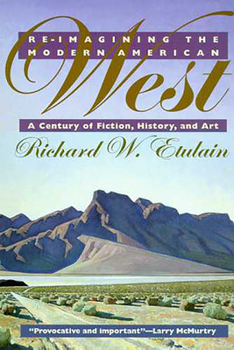Reimagining the Modern American West: A Century of Fiction, History, and Art
(Part of the Modern American West Series)
Select Format
Select Condition 
Book Overview
From the Mississippi west to the Pacific, from border to border north and south, here is the first thorough overview of novelists, historians, and artists of the modern American West. Examining a full century of cultural-intellectual forces at work, a leading authority on the twentieth-century West brings his formidable talents to bear in this pioneering study. Richard W. Etulain divides his book into three major sections. He begins with the...
Format:Paperback
Language:English
ISBN:0816516839
ISBN13:9780816516834
Release Date:September 1996
Publisher:University of Arizona Press
Length:241 Pages
Weight:1.00 lbs.
Dimensions:2.5" x 7.7" x 9.0"
Customer Reviews
1 rating
Fascinating inspection of views on the West
Published by Thriftbooks.com User , 18 years ago
Etulain's book is an investigative historiographical "overview of the cultural and intellectual history of the twentieth century" (xiii). Generally well written and always interesting, he examines the boundaries and evolution of western historical thought. To effectively handle this matter he breaks his book into three parts, titled "The West as Frontier," "The West as Region," and "The West as Postregion." He then divides each part into three roughly equal chapters on novels, histories, and art. During the age of frontierism, authors, historians, and artists conceived of the West as a wild place into which came glorious men who tame and civilized its savage wilderness. Depictions of those men generally fell into two categories: the larger-than-life representations of historical figures, such as Wild Bill Hickock and Billy the Kidd; and legendary figures of folklore and fiction, like Paul Bunyan and Febold Feboldson. Authors like Jack London and Frank Norris, historians like Frederick Jackson Turner and Logan Paxson, and artists like Frederick Remington and Charlie Russell treated the West as a kind of haven from the East. Although they all had different understandings and motivations, they all gave positive and largely historically inaccurate portrayals of American fortitude and magnificence, and lamented what they saw as the approaching death of this Western haven. By the 1920s and 1930s, the concept of "frontier" in western historiography had given way to regionalism. The prevailing thought behind regionalism was one of change. Whereas champions of the frontier had spoken of the arrival of settlers, regionalists spoke of the interplay between those settlers and their new environment over the course of time. Willa Cather in her novels O, Pioneers and My Antonia focused on the development of communities and the sense of place and home. Turner redirected his own focus to that of regionalism, Walter Prescott Webb stressed examinations of cultural maturity in geographically distinct areas, and Bernard DeVoto criticized the selfish and acquisitive moneymakers of the East for making a colony of the West. Grant Wood and Thomas Hart Benton demonstrated newness and change in their paintings, while John Steuart Curry painted not cowboys and Indians but farmers in their fields. Regionalism gave way suddenly to postregionalism following World War II and the ensuing generation of baby boomers. The West was no longer dependent on an extractive economy but had embraced industry and manufacturing. For that reason and others, people fled the smaller communities and surged towards the cities, as Los Angeles and Seattle experienced explosive growth. Furthermore, as a result of the war inhabitants of the West had a more national and international mindset. They were also more aware of the world around them. Joan Didion and Barbara Kingsolver wrote on the strength, conviction, and value of women, and Walter Clark on racial strife. Wallace Stegner ushered in envir






